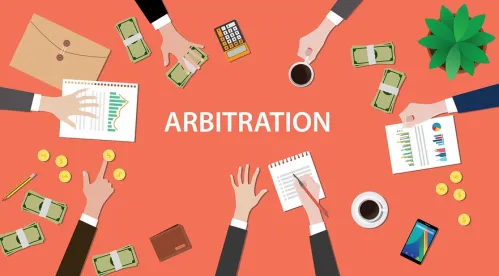As the U.S. Supreme Court observed memorably in First Options of Chicago, Inc. v. Kaplan,[1] arbitration disputes often raise “three types of disagreement” relevant to resolution of the dispute: (1) a disagreement as to the merits of the dispute; (2) a disagreement as to whether the dispute is subject to arbitration; and (3) a dispute as to who gets to decide, in the first instance, whether the dispute is subject to arbitration. The Court of Appeals for the Eleventh Circuit recently waded into this latter question, creating a circuit split with decisions by four other sister circuit courts of appeals. While a majority of circuit courts have held that an arbitration agreement’s incorporation of an arbitration forum’s rules can reflect the parties’ “clear and unmistakable” intent to delegate questions of arbitrability to the arbitrator, these four other circuits have held that incorporation of forum rules does not include delegation of authority to decide whether the parties’ agreement permits class arbitration. The Eleventh Circuit disagrees.
In Spirit Airlines, Inc. v. Maizes,[2] the Eleventh Circuit confronted whether an arbitration agreement’s express incorporation of the American Arbitration Association (AAA) rules provided sufficient evidence that the parties intended for the arbitrator—rather than a court—to decide if the parties’ arbitration agreement permitted class-wide arbitration. The Eleventh Circuit held that it did, and in so holding diverged from rulings by courts of appeals from the Third, Fourth, Sixth and Eighth Circuits.
The arbitration agreement in Spirit Airlines provided that “[a]ny dispute” arising between the parties would “be resolved by submission to arbitration . . . in accordance with the rules of the American Arbitration Association then in effect.” The AAA rules include the AAA’s Supplementary Rules for Class Arbitrations. Supplementary Rule 3, in turn, provides that “the arbitrator shall determine as a threshold matter. . . whether the applicable arbitration clause permits the arbitration to proceed on behalf of or against a class.”
The Eleventh Circuit held that this language reflected the parties’ “clear and unmistakable” intent to delegate to the arbitrator to decide, in the first instance, whether the parties’ arbitration agreement encompassed class arbitration.[3] The court explained that its prior precedent in Terminix International Co. v. Palmer Ranch Ltd. Partnership,[4] which held that incorporation of the AAA’s rules manifested the parties’ intent for the arbitrator to decide whether an arbitration agreement was enforceable, was largely controlling on the issue.[5]
The Eleventh Circuit’s reliance on Terminix highlights where its analysis diverged from that of its sister circuits. While a majority of federal circuit courts have held, consistent with Terminix, that incorporation of the AAA rules provides clear and unmistakable evidence of the parties’ intent to delegate threshold questions of arbitrability to the arbitrator, the Third, Fourth, Sixth, and Eighth circuit courts have held that incorporation is insufficient evidence to allow an arbitrator to decide the applicability of class arbitration, given the consequences of class-wide proceedings. The Eighth Circuit’s reasoning in Catamaran Corp. v. Towncrest Pharmacy[6] is representative of that approach:
The risks incurred by defendants in class arbitration (bet-the-company stakes without effective judicial review, loss of confidentiality) and the difficulties presented by class arbitration (due process rights of absent class members, loss of speed and efficiency, increase in costs) all demand a more particular delegation of the issue than we may otherwise deem sufficient in bilateral disputes.
In Spirit Airlines, however, the Eleventh Circuit rejected this view, concluding there was “no basis for [a] higher burden” to find delegation of class arbitration questions under governing Supreme Court precedent.[7]
Given that the Supreme Court has repeatedly demonstrated a keen interest in procedural arbitration issues, as well as a willingness to consider questions regarding the availability of class-wide proceedings in arbitration,[8] the circuit split generated by Spirit Airlines is likely to catch the Supreme Court’s attention. However, given the potentially significant stakes of class proceedings in an arbitration, parties to an arbitration agreement would be well advised not to wait or rely on a future Supreme Court decision; rather, they can remove all doubt by expressing in clear, specific terms whether they intend for their arbitration agreements to permit class-wide relief regardless of what set of rules they may choose to govern the arbitration proceeding.
[1] 514 U.S. 938, 942 (1995).
[2] 899 F.3d 1230, 2018 U.S. App. LEXIS 22685 (11th Cir. Aug. 15, 2018).
[3] Op. at 6-8.
[4] 432 F.3d 1327, 1332 (11th Cir. 2005).
[5] Op. at 6.
[6] 864 F.3d 966, 973 (8th Cir. 2017).
[7] Op. at 9.
[8] See, e.g., Oxford Health Plans, LLC v. Sutter, 569 U.S. 564 (2013) (when an arbitrator determines that the parties to an arbitration intended to authorize class-wide arbitration, that determination survives judicial review under § 10(a)(4) of the Federal Arbitration Act as long as the arbitrator was arguably construing the contract); Am. Express Co. v. Italian Colors Rest., 570 U.S. 228 (2013) (Federal Arbitration Act does not permit courts to invalidate a contractual waiver of class arbitration on the ground that the plaintiff’s cost of individually arbitrating a federal statutory claim exceeds the potential recovery); Stolt-Nielsen S.A. v. AnimalFeeds Int’l Corp., 559 U.S. 662 (2010) (party may not be compelled to submit to class arbitration absent agreement to do so).




 />i
/>i

